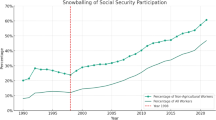Abstract
This paper analyzes the current tendency of local communities to control or manage their rate of population growth. After outlining three components of the rationale for growth management, the paper proceeds to examine the fiscal aspects of growth management. Based upon the theory of clubs and threshold analysis, a model is developed which illustrates that the fiscal impacts of the provision of local infrastructure are largely responsible for motivating growth management behavior.
Similar content being viewed by others
References
Alonso, W. 1975. “Urban Zero Population Growth,” in R. W. Scott (ed.),Management and Control of Growth. Washington, D.C.: Vol. I: 405–414.
Buchanan, J. M., 1965. “An Economic Theory of Clubs,”Economica 32, February: 1–14.
Dougharty, L., 1975.Municipal Service Pricing: Impact on Fiscal Position. Santa Monica: Rand.
Dowall, D. E., 1975.An Examination of Local Population Growth Control. Unpublished Ph.D. dissertation, University of Colorado.
Kozlowski, J. and J. T. Hughes, 1972.Threshold Analysis. London: The Architectural Press. (This is the best English source on Malisz's original development.)
Netzer, D., 1974. “Financing Suburban Development,” in W. P. Beaton (ed.),Municipal Needs, Services, and Financing. New Brunswick, N.J.: Center for Urban Policy Research.
Samuelson, P. A., 1954. “The Pure Theory of Public Expenditure.”Review of Economics and Statistics 36, November: 387–389.
Singell, L. D., 1974. “Optimum City Size: Some Thoughts on Theory and Policy,” inLand Economics 50, May: 207–212.
Tiebout, C. M., 1956. “A Pure Theory of Local Expenditures,”Journal of Political Economy 64, October: 416–424, in Beaton, op. cit.; 31–42.
Author information
Authors and Affiliations
Additional information
The author would like to acknowledge the support of the Institute of Urban and Regional Development and Allan Jacobs, for valuable comments.
Rights and permissions
About this article
Cite this article
Dowall, D.E. Fiscal impact rationale for local growth management. Ann Reg Sci 12, 83–94 (1978). https://doi.org/10.1007/BF01286113
Issue Date:
DOI: https://doi.org/10.1007/BF01286113




